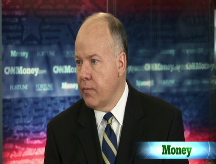Finally, dream stocks at affordable prices
The crisis on Wall Street has given you a rare chance to upgrade your portfolio. Take it.
(Money Magazine) -- There's no such thing as a perfect portfolio. Value-conscious investors like me are acutely aware of this fact. Sometimes you come across a good stock trading at a great price but there's simply no room in your portfolio at the time. In other cases you feel like a kid with his nose stuck to the windowpane of a Ferrari dealership: You spot a wonderful business you'd love to own, but you can't justify paying the price being asked.
Well, this market is giving you a second chance at these shares. Maybe you pared down your portfolio to take cover from the sell-off. More likely you've done some tax-loss selling lately. So you probably have some room in your portfolio. At the same time, the market has dramatically lowered prices on stocks you've long desired.
I want to share with you the four stocks that have been on my wish list. I'm not saying these are the cheapest equities around. Nor are they guaranteed to deliver the best short-term gains. Still, they're solid candidates for any long-term portfolio.
INTEL
Bear market loss -42%
I've always favored companies with wide economic moats - competitive advantages that serve as protection, particularly in uncertain times. Intel (INTC, Fortune 500) has built its advantage by continuing to invest even when business is bad, a simple but effective strategy that has led it to the top of the semiconductor food chain.
Its size, in turn, helps it further widen its moat. For instance, Intel's research budget alone rivals AMD's annual sales. Sure, the PC industry is maturing and the weak global economy means tech spending will be depressed for a while. But Intel runs a tight ship - it cut expenses by $2 billion in 2007 - and is priced at a cheap price/earnings ratio of around 14.
AMERICAN EXPRESS
Bear market loss -68%
Never in my lifetime did I think I'd see American Express (AXP, Fortune 500) trading at seven times earnings. AmEx is different from most credit-card companies in that it earns more from fees paid by its merchants than from interest earned on card balances.
Yes, consumer spending is weak. And the company is suffering from some self-inflicted wounds as a result of poor underwriting decisions during the housing bubble. Those standards have been tightened. And AmEx's strong brand and fee-heavy revenue stream can't be replicated. AmEx charges merchants more to accept its card because its cardholders spend more, and those fees are the cornerstone of the firm's long-term value.
ALCON
Bear market loss -40%
This is one of the largest health-care companies you've likely never heard of. Alcon (ACL) is a $22 billion business that is the dominant player in eye care around the globe, selling everything from ophthalmic drugs to intraocular lenses. Yet despite its being one of the more profitable health-care companies around, Alcon's shares have been cut in half over the past year.
DIAGEO
Bear market loss -35%
Weak consumer spending has hammered shares of this spirits giant, now trading at a P/E of 12.9. But while growth may slow in the near term, it's a poor bet to assume Diageo's iconic brands - like Guinness, Johnnie Walker and Tanqueray - won't command premium pricing over the long haul. Owning eight of the world's top 20 spirits brands and its exclusive distribution network in the U.S. give Diageo (DEO) its competitive advantage.
And remember: Strong brands and distribution networks were what helped Anheuser-Busch and Coca-Cola deliver for shareholders for so many years.
Pat Dorsey is the director of equity research for Morningstar. ![]()



